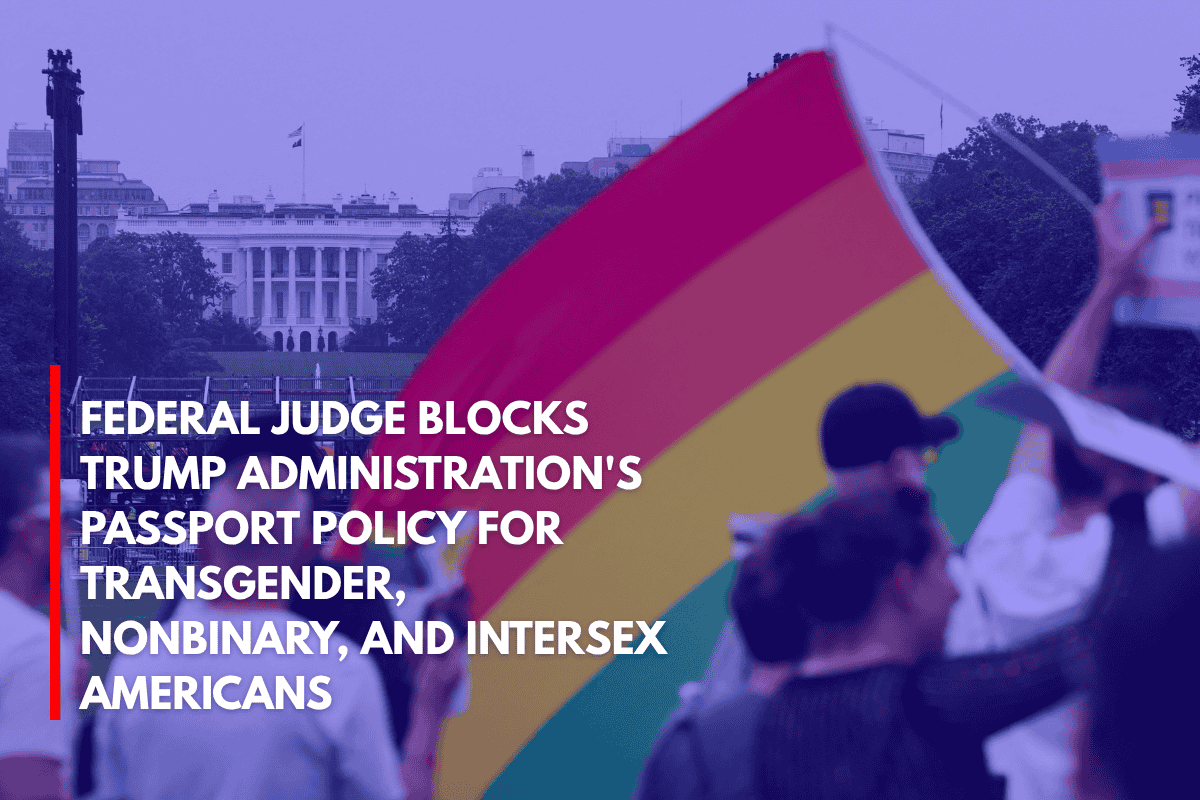Washington, D.C. – A federal judge on Tuesday extended an order blocking the Trump administration’s policy that required U.S. passports to reflect an individual’s sex “at conception.”
The ruling applies to all transgender, nonbinary, and intersex Americans who wish to change the sex designation on their passports, granting them the ability to obtain passports that align with their gender identity.
A Victory for Transgender Rights
This decision builds on a previous ruling from April 2025, which allowed six transgender and nonbinary plaintiffs to obtain passports reflecting their gender identity while their legal case continues.
The case, filed in February in the U.S. District Court for the District of Massachusetts, challenges the Trump administration’s passport policy, arguing that it is driven by impermissible animus and violates the rights of transgender and nonbinary individuals.
The legal teams representing the plaintiffs, including the American Civil Liberties Union (ACLU), ACLU of Massachusetts, and Covington & Burling LLP, requested that the court extend its preliminary injunction to cover not just the six plaintiffs, but all individuals who may be impacted by the policy now or in the future.
Judge Kobick’s Ruling
Judge Julia E. Kobick, appointed by President Biden, granted this request on Tuesday. In her ruling, Judge Kobick noted that both the six original plaintiffs and the new class of plaintiffs face a common injury: they are unable to obtain passports with a sex designation that matches their gender identity.
The judge also explained that government-issued identification documents, such as passports, are essential for many daily activities beyond international travel, including employment, banking, and renting a car.
Without the injunction, the plaintiffs would be forced to disclose their transgender or nonbinary status every time they present their passport, making them vulnerable to discrimination, harassment, and violence.
The Policy and Its Impact
The Trump administration’s policy, enacted shortly after he returned to office in January 2021, directed the State Department and other agencies to require documents like passports and visas to reflect an individual’s sex at birth, rather than their gender identity.
Prior to this, the State Department allowed individuals to self-select their sex designation on passports, including an “unspecified” gender marker, denoted by the letter X.
The policy was part of an executive order signed by Trump, which proclaimed that the U.S. recognizes only two sexes, male and female, and that these sexes cannot be changed. The order has faced significant opposition from LGBTQ+ advocates, who argue that it marginalizes transgender, nonbinary, and intersex individuals.
A Legal and Emotional Victory
The ruling has been hailed as a critical victory for equal justice and against discrimination, with advocates praising it as a step forward in the fight for LGBTQ+ rights.
Jessie Rossman, Legal Director at the ACLU of Massachusetts, said that Tuesday’s decision “acknowledges the immediate and profound negative impact” of the policy, emphasizing that it prevents discrimination and ensures dignity for transgender and nonbinary people.
Li Nowlin-Sohl, Senior Staff Attorney for the ACLU’s LGBTQ & HIV Project, called the decision a historic win in the broader battle against the Trump administration’s efforts to undermine the rights of transgender people. She added that the policy is a baseless barrier and a violation of the dignity that all individuals deserve.
The Path Forward
While the ruling is a significant step, the case remains ongoing. The State Department has yet to comment on the latest developments. The ACLU and other advocates continue to push for policies that ensure equal treatment for transgender, nonbinary, and intersex individuals in the U.S. and beyond.











Leave a Reply